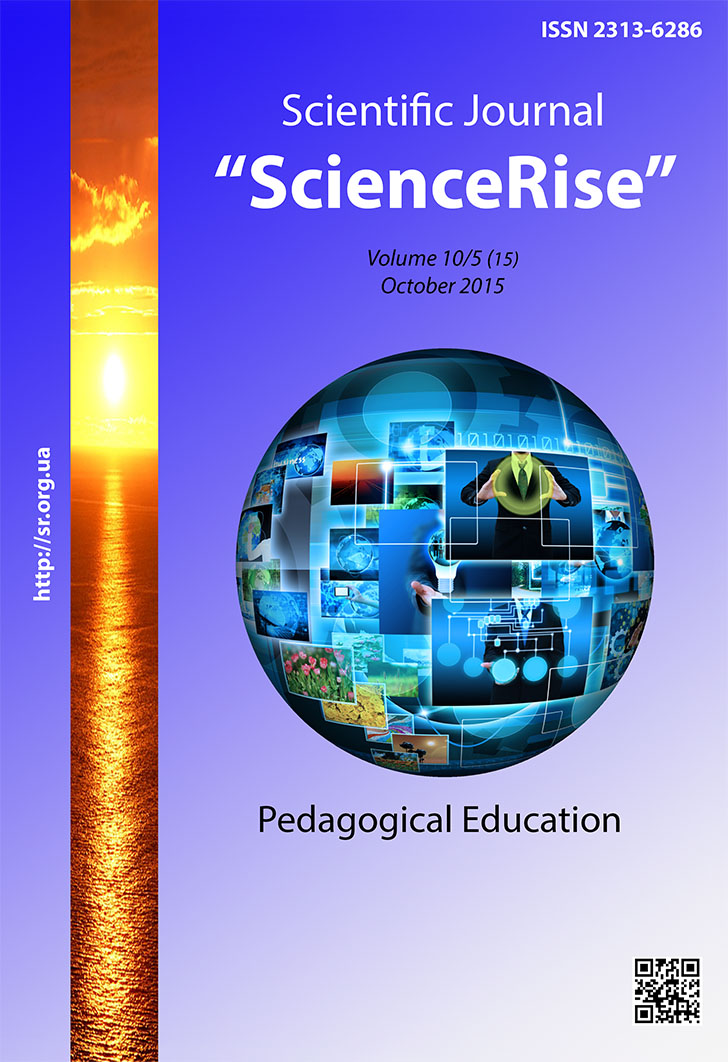Peculiarities es of educational movement formation in Сarpathian Кuthenia
DOI:
https://doi.org/10.15587/2313-8416.2015.51779Keywords:
Transcarpathia, pedagogical society "Teaching society of Carpathian Ruthenia», members of society, statutesAbstract
The scientific article analyzes peculiarities of educational movement formation in Carpathian Ruthenia and the establishment of «Teaching society of Carpathian Ruthenia” TSCR. The paper also looks into the conditions and purpose of organization, the role of leading teachers of the land in the development of social community. Socio-political conditions of those times and reaction to them of pedagogical public has been generally describedReferences
Berezivs'ka, L. (1999). Osvitn'o-vyhovna dijal'nist' kyi'vs'kyh prosvitnyc'kyh tovarystv (druga polovyna ХІХ – poch. ХХ st.). Kyiv: Molod', 191.
Bilavych, G. (1994). Ukrai'ns'ke pedagogichne tovarystvo “Ridna shkola”. Pochatkova shkola, 1, 54–56.
Pobirchenko, N. S. (2000). Pedagogichna i prosvitnyc'ka dijal'nist' ukrai'ns'kyh Gromad u drugij polovyni HIH – na pochatku HH stolittja (u dvoh knygah). Knyga I: Kyi'vs'ka gromada; Knyga II: Gromady Naddniprjans'koi' Ukrai'ny. Kyiv: Naukovyj svit, 307, 185.
Lihtej, I., Kerecman, N. (1995). Dijal'nist' gromads'kyh organizacij. T. II. Narysy istorii' Zakarpattja. Uzhgorod: Zakarpattja, 413–429.
Gomonnaj, V. V. (1992). Antologija pedagogichnoi' dumky Zakarpattja (XIХ – XХ st.). Uzhgorod: Zakarpattja, 297.
Hymynec', V. V., Strichak, P. P., Kachur, B. M., Talapkanych, M. I. (2009). Osvita Zakarpattja. Uzhgorod: Karpaty, 464.
Klyma, V. (1936). Shkol'noe dѣlo y prosvѣnie na Podkarpatskoj Rusy. Uzhgorod, 196, 102–105.
Pešek, J. (1923). Školnictvo v Podkarpatskoj Rusi. Podkarpatska Rus’. Obraz obstojatel’ctv prirodnych, hospodarskich, političeskich, cerkovnych, jazykovych i prosvititel’nych. Praha: Orbis, 207, 171–182.
Jakesh, A., Shymek, J. (1930). Shkôl'nyctvo na Podkarpatskoj Rusy. Uchytel', XI (3-4), 29–47.
Voloshyn’, A. (1920). Bratja y sestry! Uchyteli y uchytel'nycy. Uchytel', I (1-2), 3–4.
Kuzma, Y. (1920). Pro hodzhenja do shkolу. Uchytel', I (10), 1–3.
Guljanych’, M. (1920). Nѣskol'ko slov’ o nashyh’ shkolah. Uchytel', I (10), 3–5.
Bochek’, S. (1921). Eshhe pro hodzhenja do shkoly. Uchytel', II (1), 7–13.
Magochij, P. (1994). Formuvannja nacional'noi' samosvidomosti: Pidkarpats'ka Rus' (1848–1948). Uzhgorod: Polychka “Karpats'kogo kraju”, 295.
Pesina, J. (1933). Skolstvi na Podkarpatske Rusi v pritomnosti. Praha: Statni nakladatelstvo v Praze, 51.
Sluzhbovyj obit’ uchytel'stva (1920). Uchytel', I (7), 9.
Borysenko, V. J., Teleguz, I. O. (2012). Nacional'na osvita i formuvannja ukrai'ns'koi' modernoi' nacii' u 1921–1934 rokah: jevropejs'ki tendencii' ta radjans'ki realii'. Kyiv: Vyd-vo NPU im. M.P. Dragomanova, 156.
Ignat, A. (1970). Stan osvity na Zakarpatti v 20–30-h rokah XX st. Velykyj Zhovten' i rozkvit vozz’jednanogo Zakarpattja. Uzhgorod: Karpaty, 212–222.
Pan'kevych, Y. (1920). Pershij uchytel's'kij kong'res na Podkarpatskôj Rusy. Uchytel', I (5-6), 1–17.
Vysty yz’ uchytel'skogo zhytja (1920). Uchytel', I (7), 8.
Kongres’ pedagogychnyj (1920). Uchytel', I (3), 15.
Pan'kevych, Y. (1920). Zadachy uchytel'stva y shkolу na Podkarpatskôj Rusy. Kôl'ka slôv’ s’ pryvodu uchytel'skogo kong'resa. Uchytel', I (4), 5–7.
Shtec', M. (1969). Literaturna mova ukrai'ns'kogo Zakarpattja i Shidnoi' Slovachchyny (pislja 1918 roku). Bratislava: Slovac'ke pedagogichne v-vo, 169.
Organizacija uchytel'stva Pôdkarpatskoj Rusy (1920). Uchytel', I (8), 14–15.
Prezydium’ UTPR y Red. Kom. «Narodnoj Shkoly» (1935). Narodnaja Shkola, 3, 2–3.
Downloads
Published
Issue
Section
License
Copyright (c) 2015 Галина Миколаївна Шикітка

This work is licensed under a Creative Commons Attribution 4.0 International License.
Our journal abides by the Creative Commons CC BY copyright rights and permissions for open access journals.
Authors, who are published in this journal, agree to the following conditions:
1. The authors reserve the right to authorship of the work and pass the first publication right of this work to the journal under the terms of a Creative Commons CC BY, which allows others to freely distribute the published research with the obligatory reference to the authors of the original work and the first publication of the work in this journal.
2. The authors have the right to conclude separate supplement agreements that relate to non-exclusive work distribution in the form in which it has been published by the journal (for example, to upload the work to the online storage of the journal or publish it as part of a monograph), provided that the reference to the first publication of the work in this journal is included.

